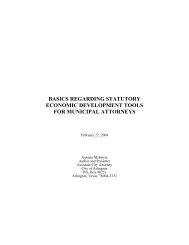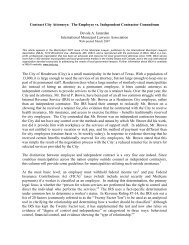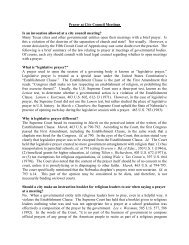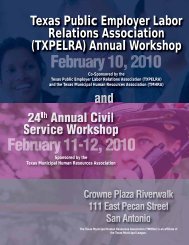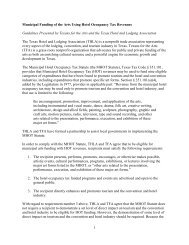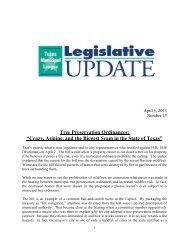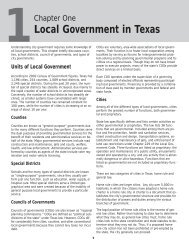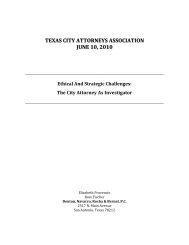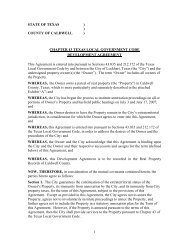Roles and Responsibilities of Officers In General Law Cities - Texas ...
Roles and Responsibilities of Officers In General Law Cities - Texas ...
Roles and Responsibilities of Officers In General Law Cities - Texas ...
Create successful ePaper yourself
Turn your PDF publications into a flip-book with our unique Google optimized e-Paper software.
general law municipality operating under the commissionform <strong>of</strong> government, the mayor’s term <strong>of</strong> <strong>of</strong>fice is two years(Local Government Code Section 24.023).<strong>In</strong> any city, the term <strong>of</strong> <strong>of</strong>fice <strong>of</strong> members <strong>of</strong> the governingbody can be extended by ordinance to three years or fouryears upon approval <strong>of</strong> a majority <strong>of</strong> the voters voting at anelection on the question (<strong>Texas</strong> Constitution, Article XI, Section11).VacanciesWhen the mayor is temporarily unable to perform his or herduties because <strong>of</strong> illness, out-<strong>of</strong>-town travel, or similar reasons,the mayor pro tem assumes the responsibilities <strong>of</strong> the<strong>of</strong>fice on an interim basis (please see discussion <strong>of</strong> mayorpro tem on the next page). But if a permanent vacancy occursin the <strong>of</strong>fice <strong>of</strong> mayor as a result <strong>of</strong> death, disability,resignation, or some other reason, the vacancy must befilled according to prescribed procedures.<strong>In</strong> a Type B general law city operating under the aldermanicform <strong>of</strong> government, a mayoral vacancy is always filled byappointment by the board <strong>of</strong> aldermen. The term <strong>of</strong> the personappointed expires at the same time that the term <strong>of</strong> theperson who vacated the <strong>of</strong>fice would have expired if he orshe had remained in <strong>of</strong>fice (Local Government Code Section23.002).<strong>In</strong> a Type A general law city operating under the aldermanicform <strong>of</strong> government, the vacancy can be filled either by appointment<strong>of</strong> the city council or by a special election if themayor’s <strong>of</strong>fice is the only one vacant. However, if anothervacancy exists on the board <strong>of</strong> aldermen when the mayor’s<strong>of</strong>fice is vacant, both vacancies must be filled at a specialelection. When a vacancy is filled by appointment, the term<strong>of</strong> the person appointed expires at the next general municipalelection. When a vacancy is filled by special election,the person elected serves out the remainder <strong>of</strong> the unexpiredterm <strong>of</strong> the vacancy being filled (Local GovernmentCode Section 22.010).<strong>In</strong> a Type C city operating under the commission form <strong>of</strong>government, a vacancy in the <strong>of</strong>fice <strong>of</strong> mayor must be filledby appointment by the two remaining members <strong>of</strong> the board<strong>of</strong> commissioners. But if there are two vacancies on theboard <strong>of</strong> commissioners, they must be filled at a specialelection called by the county judge, <strong>and</strong> the persons electedserve out the remainder <strong>of</strong> the unexpired terms <strong>of</strong> the vacanciesbeing filled (Local Government Code Section 24.026).If the terms <strong>of</strong> <strong>of</strong>fice in a city have been changed to three orfour years, appointment is no longer an option. Any vacancymust be filled by special election (<strong>Texas</strong> Constitution, ArticleXI, Section 11).Absences from Council Meetings<strong>In</strong> a Type A general law city, the mayor is a “member” <strong>of</strong> thecity council (Local Government Code Section 22.031).Under Section 22.041 <strong>of</strong> the Local Government Code, “if amember <strong>of</strong> the governing body is absent for three regularconsecutive meetings, the member’s <strong>of</strong>fice is considered vacantunless the member is sick or has first obtained a leave<strong>of</strong> absence at a regular meeting.”RemovalProcedures for removing the mayor or a councilmemberfrom <strong>of</strong>fice are set forth in Section 21.002 <strong>of</strong> the Local GovernmentCode. Under the law, a member <strong>of</strong> the governingbody is subject to removal for incompetence, <strong>of</strong>ficial misconduct,or intoxication. A petition for removal must be filedwith a district court, may be filed by any resident <strong>of</strong> the city,<strong>and</strong> must state the alleged grounds for removal. The judgemay decide to issue a citation to the member in question ormay decline to do so. If the judge declines to issue a citation,the petition is dismissed at the cost <strong>of</strong> the petitioner. Ifthe judge issues a citation to the member, the member mustappear before the judge to answer the petition <strong>and</strong> may requesta trial by jury. The petitioner must execute a bond inan amount fixed by the judge. The bond shall be used topay damages <strong>and</strong> costs to the member if the allegedgrounds for removal are found to be insufficient or untrue.The final judgment on the issue may be appealed by eitherparty. Conviction <strong>of</strong> the member for any felony or <strong>of</strong>ficialmisconduct will result in immediate removal, <strong>and</strong> the removedmember is ineligible for reelection for two years.There is no such thing in a general law city as “recall,”which is a procedure citizens can use to vote an incumbentmayor or councilmember out <strong>of</strong> <strong>of</strong>fice before the expiration<strong>of</strong> his or her term. The power <strong>of</strong> recall is limited to voters inhome rule cities in which the charter provides for the procedure.Compensation<strong>In</strong> cities operating under the commission form <strong>of</strong> government,the board <strong>of</strong> commissioners may, by ordinance, fix themayor’s compensation at a maximum <strong>of</strong> $5 for each regularcommission meeting <strong>and</strong> $3 for each special meeting. Alternatively,the board <strong>of</strong> commissioners in a city <strong>of</strong> less than2,000 can pay the mayor a salary <strong>of</strong> up to $600 per year,while the board <strong>of</strong> commissioners in a city <strong>of</strong> 2,000 orgreater population can pay the mayor up to $1,200 per year(Local Government Code Section 141.003).<strong>In</strong> general law cities operating under the aldermanic form <strong>of</strong>government, no maximum salary amount is fixed for themayor. The governing body can set the mayor’s compensationat any level it chooses (Local Government Code Sections141.001 <strong>and</strong> 141.002).19



